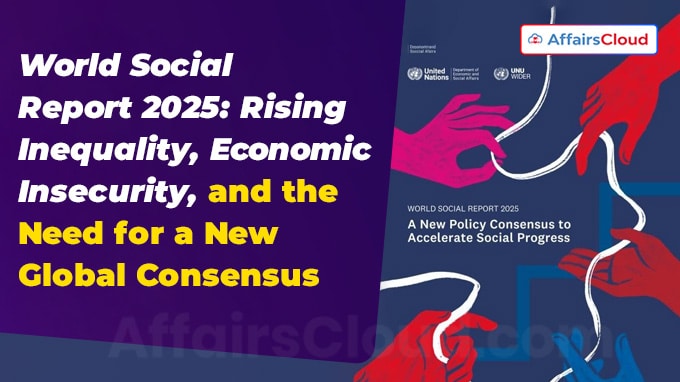 In April 2025, The United Nations Department of Economic and Social Affairs (UN DESA), has released its flagship publication “World Social Report 2025: A New Policy Consensus to Accelerate Social Progress”.
In April 2025, The United Nations Department of Economic and Social Affairs (UN DESA), has released its flagship publication “World Social Report 2025: A New Policy Consensus to Accelerate Social Progress”.
- The 2025 report, co-produced by the United Nations University World Institute for Development Economics Research (UNU-WIDER) and the Division for Inclusive Social Development (DISD), UN DESA.
- The report raises concern for a new policy consensus based on three principles: Equity, Economic Security for all, and Solidarity. These are essential to strengthen social, economic and environmental dimensions of sustainable development.
World Social Report 2025:
The report is a reflection on the achievements and lessons of the past and presents a way forward to delivering on the commitments made in the Copenhagen Declaration and Programme of Action, adopted in 1995 and accelerating the implementation of the broader set of Sustainable Development Goals (SDGs)
Key Highlights:
Insecure livelihoods and enduring poverty risks:
- Around 60% of the global population faces economic insecurity, while over 690 million people continue to live in extreme poverty.
- Almost 60% of people worldwide are worried about losing their jobs and not finding a job.
Persistent and Deep Inequalities:
i.Since 1990, income inequality has increased in most-high income countries and in some middle-income countries, including China and India. In most countries income inequality as measured by the Gini Coefficient has increased in 52 of 128 countries over the past 30 years.
- Income inequality has grown in two-thirds of countries, with the richest 1% holding more wealth than 95% of the global population.
- The share of income owned by the richest 1% of the population increased or remained stable, at a high level, in 113 out of 182 countries from 1990 to 2002.
- Out of 27 countries from Asia, taken for the assessment, 13 countries have witnessed rising inequality, 12 countries has decreased inequality and 2 countries in ‘No Trend’ category.
ii.Climate Change, causing disruptions, is likely to reduce the livelihood opportunities of future generations. While the poor countries are often hit by environmental degradation, the high-income countries are the biggest polluters.
- In 2024, one in five people faced climate disasters, and one in seven endured conflict, reversing key development gains.
iii.Social Inclusion, is far for all people and groups from getting the same opportunity to live a healthy and prosperous life.
- Almost 80% in South Africa, 60% in Latin America and 50% in India and 40% in United States, can still be attributed to inequality based on race, caste, place of birth, or family background
- In India, people belonging to Scheduled Castes (SC) and Scheduled Tribes (ST) are less socially mobile than other groups.
Social Trust:
i.The weakening of social cohesion undermines capacities for collective action, threatening social progress and the achievement of the SDGs.
- Over half of the global population has little or no trust in their government. Each consecutive cohort, from those born in 1930s to those born in 1990s has less trust in government
- Less than 30% of the countries with data think that most people can be trusted.
ii.Weaking social cohesion and growing polarization are causing alarm, rising to global agendas.




